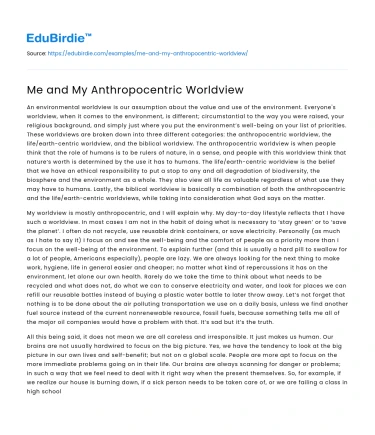An environmental worldview is our assumption about the value and use of the environment. Everyone's worldview, when it comes to the environment, is different; circumstantial to the way you were raised, your religious background, and simply just where you put the environment’s well-being on your list of priorities. These worldviews are broken down into three different categories: the anthropocentric worldview, the life/earth-centric worldview, and the biblical worldview. The anthropocentric worldview is when people think that the role of humans is to be rulers of nature, in a sense, and people with this worldview think that nature’s worth is determined by the use it has to humans. The life/earth-centric worldview is the belief that we have an ethical responsibility to put a stop to any and all degradation of biodiversity, the biosphere and the environment as a whole. They also view all life as valuable regardless of what use they may have to humans. Lastly, the biblical worldview is basically a combination of both the anthropocentric and the life/earth-centric worldviews, while taking into consideration what God says on the matter.
My worldview is mostly anthropocentric, and I will explain why. My day-to-day lifestyle reflects that I have such a worldview. In most cases I am not in the habit of doing what is necessary to ‘stay green’ or to ‘save the planet’. I often do not recycle, use reusable drink containers, or save electricity. Personally (as much as I hate to say it) I focus on and see the well-being and the comfort of people as a priority more than I focus on the well-being of the environment. To explain further (and this is usually a hard pill to swallow for a lot of people, Americans especially), people are lazy. We are always looking for the next thing to make work, hygiene, life in general easier and cheaper; no matter what kind of repercussions it has on the environment, let alone our own health. Rarely do we take the time to think about what needs to be recycled and what does not, do what we can to conserve electricity and water, and look for places we can refill our reusable bottles instead of buying a plastic water bottle to later throw away. Let’s not forget that nothing is to be done about the air polluting transportation we use on a daily basis, unless we find another fuel source instead of the current nonrenewable resource, fossil fuels, because something tells me all of the major oil companies would have a problem with that. It’s sad but it’s the truth.
Save your time!
We can take care of your essay
- Proper editing and formatting
- Free revision, title page, and bibliography
- Flexible prices and money-back guarantee
All this being said, it does not mean we are all careless and irresponsible. It just makes us human. Our brains are not usually hardwired to focus on the big picture. Yes, we have the tendency to look at the big picture in our own lives and self-benefit; but not on a global scale. People are more apt to focus on the more immediate problems going on in their life. Our brains are always scanning for danger or problems; in such a way that we feel need to deal with it right way when the present themselves. So, for example, if we realize our house is burning down, if a sick person needs to be taken care of, or we are failing a class in high school or college, we are more than likely to deal with those issues instead of dealing with the potential progressive degradation of the environment. “The human race is more likely to solve a problem that requires a hammer if we have a hammer at hand. For global environmental problems, we don't have a hammer”.
People that do care for the well-being of the environment and act on it, are a rare breed, but that does not mean they do not exist. However, up to 90% of the time in our day-today lives, Americans are inside. Spending this much of our time indoors means we are cut off from the environment. And with more and more forms of entertainment, the degradation of our environment and reasons to stay inside, might only increase because the less people see the damage, they may be causing… well let’s just say ‘out of sight, out of mind’.
Nevertheless, I did say that I was ‘mostly anthropocentric’. Meaning, if I see easy accessibility to a recycling ben, I will put whatever trash I have that is plastic or metal in there. I also carpool when the opportunity presents itself and I do not take ridiculously long showers. Even though it is impossible to get every person involved, I do believe God made it our responsibility to take care of the earth He put us on, as well as all of those that inhabit it. However, as I said before, it is not the main concern of most people. So, taking into consideration the majority of our poor habits that don’t help the progressing degradation of our environment, I can’t help but wonder how the consequences pan out in the future.






 Stuck on your essay?
Stuck on your essay?

